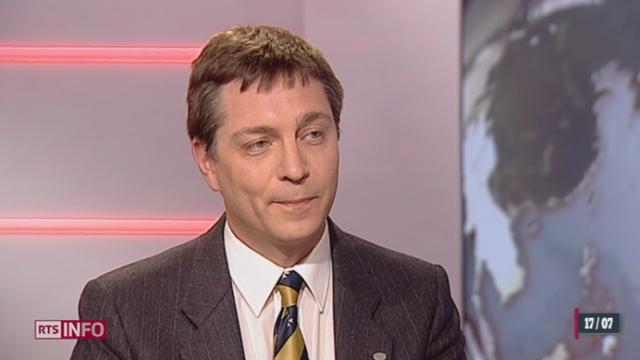Secret service reforms: ‘essential to combat modern threats’
The proposed reforms to the Swiss secret service are urgently needed in order to give the agency effective tools to counter threats like terrorism, argues security specialist Alexandre Vautravers.
Changes to the intelligence service legislation will give the authorities new ways of operating in four specific areas: terrorism, attacks against critical infrastructure, the proliferation of weapons of mass destruction and banned activities by foreign spies.

The new changes [which give agents the right not only to tap phone lines but also to survey emails, access computer systems abroad and bug private apartments] will not be widely used and will not be used against groups or activists who have no ties to terrorist networks. Basically it will involve about a dozen cases a year and be subject to appropriate monitoring.
Over the past 12 months, 270 people have died in terrorist attacks in Europe and even more have been injured and traumatised. Almost every day terrorism makes the headlines. And the actions of certain terrorist networks have implications for Switzerland too. It is well known that on their own the police and army are only partly effective in combating this threat. Terrorism poses serious challenges to our legal system and democratic values. Young people are being radicalised on the internet and on social media, and that is where the financing and communication between jihadist terror groups takes place. It is crucial to expose these networks in order to put an end to this threat.
Major terrorist attacks show just how vulnerable our societies are. Our economy, businesses and administrations are extremely exposed to cyberattacks. These can result in the temporary or long-term paralysis of banking activities, communication or energy supplies. Hacking by criminal groups or states and the illegal transmission of online data can have a tremendous impact and cost for the economy, for society and for our reputation. Switzerland cannot allow itself to become a lawless place on the internet. Like our neighbours, we need to have tools that can detect illegal or dangerous activities, control them or collect suitable evidence.

More
Secret service reforms: ‘a problematic shifting of responsibility’
The concealment or transfer of technologies that might allow terrorist groups or states to build chemical, biological and radiological or nuclear weapons is illegal in Switzerland and elsewhere. But the destructive capability of such weapons means that some individuals are willing to pay huge amounts of money to try to obtain them secretly. It is important that such actions can be detected and prevented thanks to cooperation between states. Switzerland’s credibility and international commitments are at stake.
Currently Switzerland does not have the tools in place to effectively combat these threats and it is not able to strictly apply the law relating to illegal activities by foreign intelligence services. Switzerland is largely dependent on these same foreign agencies, which only pass on information when they deem it necessary. This is unacceptable and inappropriate for an independent and neutral state. It does not guarantee the long-term security of Switzerland’s economy and people.
The tools being made available to the Federal Intelligence Service (FIS) can only be used when authorised by the Federal Administrative Court and by three cabinet ministers (in charge of defence, foreign affairs and justice). What’s more, appeals are possible to an independent control body when internet searches are being carried out. The entire system is overseen by a parliamentary committee with members from each party.
Compared with similar intelligence laws in place in neighbouring countries, the democratic checks and balances of the FIS mandate and tools are well respected. The legal changes only apply in very strict cases: terrorism, critical infrastructure, spying and chemical, biological, and radiological or nuclear weapons. These are specific serious threats to the security of Switzerland and to its people. For these reasons, it is essential that voters back the amendments to the new intelligence legislation in order to improve our safety and the scope of action of our secret services.
Leftwing political parties, trade unions and civil society groups collected more than 56,000 signatures to challenge the planned law, sponsored by the government, in a nationwide vote.
An overwhelming majority in parliament had approved the reform last September. The legal amendment that voters will decide on on September 25 will give the Federal Intelligence ServiceExternal link (FIS) the right not only to tap phone lines but also to survey emails, access computer systems abroad and bug private apartments.
Previous reforms to boost the powers of the intelligence service were rejected by parliament in 2009. In 2010 the domestic and foreign units were merged to become the FIS.
A separate referendum allowing the justice authorities to install computer surveillance programs to investigate crimes failed earlier this month. Campaigners, mainly youth chapters of political parties from the left and the right, did not succeed in collecting at least 50,000 signatures within 100 days.
The views expressed in this article are solely those of the author, and do not necessarily reflect the views of swissinfo.ch.
Opinion series
swissinfo.ch publishes op-ed articles by contributors writing on a wide range of topics – Swiss issues or those that impact Switzerland. The selection of articles presents a diversity of opinions designed to enrich the debate on the issues discussed
Translated from French by Simon Bradley

In compliance with the JTI standards
More: SWI swissinfo.ch certified by the Journalism Trust Initiative













You can find an overview of ongoing debates with our journalists here . Please join us!
If you want to start a conversation about a topic raised in this article or want to report factual errors, email us at english@swissinfo.ch.